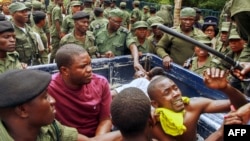The Zambia Episcopal Conference has warned Zambians not to take the country’s peace for granted after expressing concern about inter-party violence among supporters of political parties in the run-up to the August 11 general election.
In a letter issued on the state of the nation in 2016, the nation's Catholic bishops expressed strong opposition to what they said was the vulgar language politicians have been using against each other.
They were also concerned about "pockets of violence in the recent past," especially in the parliamentary by-election and in the run-up to the presidential by-election last January 20, said Father Cleophas Lungu, general secretary of the conference.
The bishops said the current political culture does not reflect a maturing democracy. They faulted political leaders for failing to stop the conduct, and in some cases for fanning the flame that led party members to engage in hooliganism and violence.
Lungu said the priests want to ensure that politicians and their supporters do not disturb the country’s “oasis of peace” as parties prepare to launch their campaigns to canvass for votes ahead of the presidential, parliamentary and local elections.
“We do not take peace for granted. It is a gift from God, but also a responsibility of citizens, but more so a responsibility that shoulders upon our leaders,” he said.
Call for police impartiality
The priests also called on the police to be impartial in the enforcement of the Public Order Act. Enforcement has often been selective, they said.
Zambian police say the Public Order act underscores the importance of groups and political parties coordinating their planned activities with the police to ensure there is peace and stability. But opposition party supporters say the police use the measure to violently suppress their meetings. They also said the police appear to be doing the bidding of the ruling Patriotic Front party, an accusation the police deny.
“This is a piece of legislation that, despite the provision of the freedom of association, the freedom of speech in the bill of rights of the constitution, takes away that freedom, essentially by giving powers to the police to manage and apply restrictions to people who would want to carry out these political activities,” Lungu said.
“The Catholic bishops in Zambia did categorically indicate that they are not pleased with the way the police sometimes conduct themselves," he said. "They called on the police to be objective, to be nonpartisan, and for the police to be professional. The bishops said that the police tend to favor the politicians in the ruling party, and the opposition parties are not guaranteed their well-deserved freedom of association and of peaceful political activity.”
Lungu said the bishops have called on President Edgar Lungu and his government as well as the police to rise above partisan politics and to lead in the promotion of true reconciliation and pea








